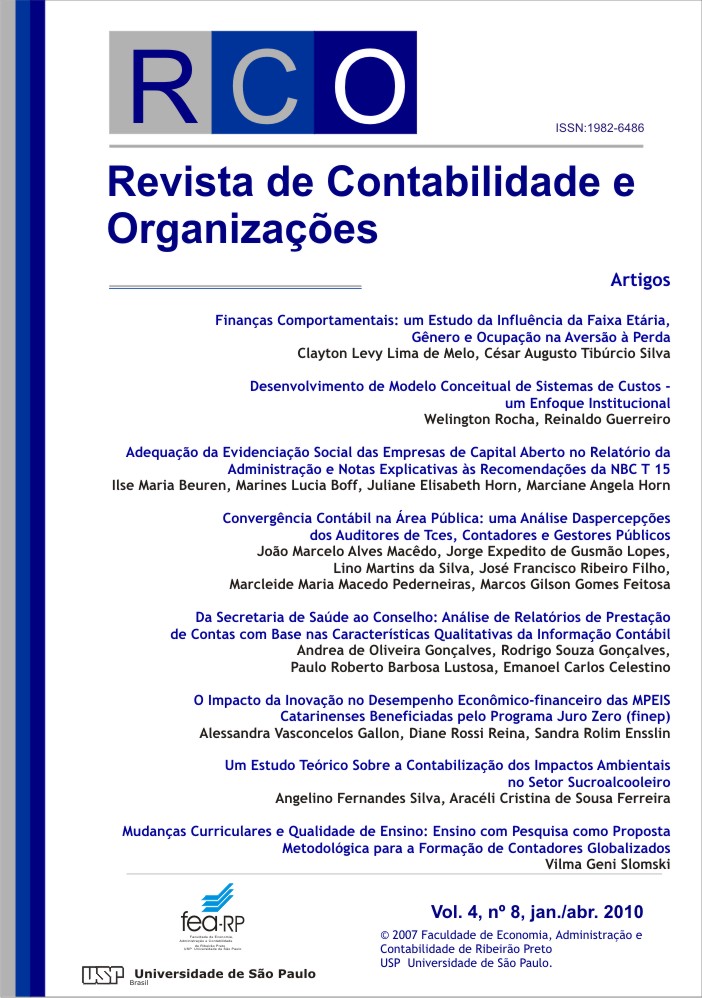Desenvolvimento de modelo conceitual de sistemas de custos: um enfoque institucional
DOI:
https://doi.org/10.11606/rco.v4i8.34757Palavras-chave:
Teoria Institucional, sistemas de custeio, Contabilidade GerencialResumo
O estudo demonstra que o modelo de institucionalização de Burns e Scapens (2000), especialmente no que se refere ao processo de codificação de rotinas e regras, pode ser aplicado para analisar a implementação de um novo sistema de contabilidade gerencial em um grande banco brasileiro. Como aquele modelo é relativamente recente, poucos estudos utilizaram sua estrutura conceitual em pesquisas empíricas. Alguns (Soin et al., 2002; Spraakman, 2006; Guerreiro et al., 2006) adotaram o que pode ser denominado perspectiva institucional para estudar vários aspectos da Contabilidade Gerencial, mas o presente artigo é o primeiro a focar especificamente a modelagem da fase inicial do processo de mudança no setor bancário a partir de uma perspectiva da Teoria Institucional. Utilizou-se o método de estudo de caso para avaliar os estágios embrionários do processo de implementação. Os dados foram coletados por meio de entrevistas e análise documental a respeito dos seguintes aspectos: (i) os antecedentes do processo de mudança; (ii) as características operacionais e organizacionais do banco e (iii) o processo de modelagem usado para conceber o sistema. As principais conclusões foram que: (a) a visão institucional é tão importante quanto a dimensão técnica-racional na fase de concepção do novo modelo de custeio; (b) o processo de codificação deve especificar regras e rotinas que sejam coerentes com as crenças institucionais e com as práticas dos membros do staff e (c) a probabilidade de sucesso é significativamente incrementada quando os novos sistemas são modelados em termos do modelo adaptado de Burns e Scapens (2000). Finalmente, o estudo apresenta uma nova visão a respeito da implementação de sistemas de custeio em geral, com mais foco na dimensão institucional do que na dimensão racional-normativa.Downloads
Publicado
Edição
Seção
Licença
A RCO adota a política de Acesso Livre (Libre Open Access), sob o acordo padrão Creative Commons (CC BY-NC-ND 4.0). O acordo prevê que:
- A submissão de texto autoriza sua publicação e implica compromisso de que o mesmo material não esteja sendo submetido a outro periódico. O original é considerado definitivo;
- Autores mantêm os direitos autorais e concedem à revista o direito de primeira publicação, com o trabalho simultaneamente licenciado sob a Licença Creative Commons Attributionque permite o compartilhamento do trabalho com reconhecimento da autoria e publicação inicial nesta revista;
- Autores têm autorização para assumir contratos adicionais separadamente, para distribuição não-exclusiva da versão do trabalho publicada nesta revista (ex.: publicar em repositório institucional ou como capítulo de livro), com necessário reconhecimento de autoria e publicação inicial nesta revista;
- Autores têm permissão e são estimulados a publicar e distribuir seu trabalho online (ex.: em repositórios institucionais ou na sua página pessoal) antes ou durante o processo editorial, já que isso pode gerar alterações produtivas, bem como aumentar o impacto e a citação do trabalho publicado (Veja O Efeito do Acesso Livre);
- A revista não paga direitos autorais aos autores dos textos publicados;
- O detentor dos direitos autorais da revista, exceto os já acordados no acordo de Libre Open Access (CC BY-NC-ND 4.0), é o Departamento de Contabilidade da Faculdade de Economia, Administração e Contabilidade de Ribeirão Preto da Universidade de São Paulo.
Não são cobradas taxas de submissão ou de publicação.
São aceitos até 4 autores por artigo. Casos excepcionais devidamente justificados poderão ser analisados pelo Comitê Executivo da RCO. São considerados casos excepcionais: projetos multi-institucionais; manuscritos resultantes da colaboração de grupos de pesquisa; ou que envolvam grandes equipes para coleta de evidências, construção de dados primários e experimentos comparados.
É recomendada a ordem de autoria por contribuição, de cada um dos indivíduos listados como autores, especialmente no desenho e planejamento do projeto de pesquisa, na obtenção ou análise e interpretação de dados e redação. Os autores devem declarar as efetivas contribuições de cada autor, preenchendo a carta ao editor, logo no início da submissão, responsabilizando-se pelas informações dadas.
É permitida a troca de autores durante todo o processo de avaliação e, antes da publicação do manuscrito. Os autores devem indicar a composição e ordem final de autoria no documento assinado por todos os envolvidos no aceite para publicação. Caso a composição e ordem de autoria seja diferente da informada anteriormente no sistema, todos autores anteriormente listados deverão se manifestar favoráveis.
No caso de identificação de autoria sem mérito ou contribuição (ghost, guest or gift authorship), a RCO segue o procedimento recomendado pela COPE.








